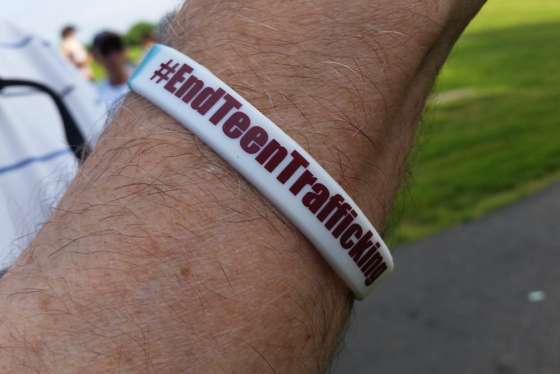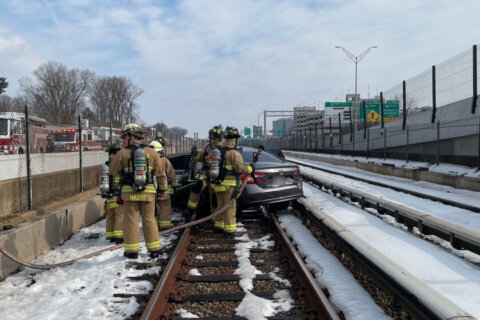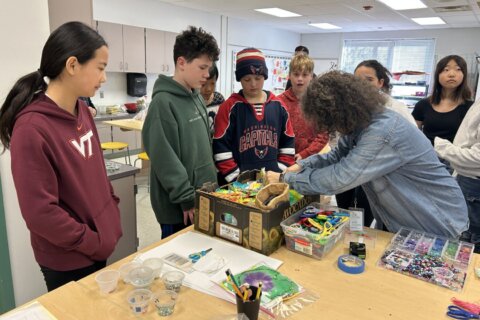WASHINGTON — Teen sex trafficking is a major problem in Northern Virginia. But sometimes victims of this crime are so broken that it’s almost impossible for them to ever overcome the damage that’s been done.
“It ruins their lives. There’s no coming back from it,” said Fairfax County police Detective Bill Woolf, who works with the police department’s major crimes division in the child exploitation unit that deals with human trafficking in Northern Virginia.
He said that according to the National Human Trafficking Hotline, Northern Virginia continues to be a hot spot for teen sex trafficking. And traffickers are very cunning in who they target.
They target both girls and boys. But their main target is girls between 11 and 14 who have low self-esteem.
“This is definitely coercion and manipulation,” said Liz Payne with Just Ask, a nonprofit that works to end trafficking.
Teen sex traffickers are adept at identifying potential victims and they work methodically to hook the victims, she said.
“They absolutely have a business model that they’re looking for those who have lower self-esteem,” Payne said. “We’ve heard reports even in a mall they can say ‘Hey, you’re really pretty,’ and if they look down, then they know that they have an in and that there’s a self-esteem issue and then they can pursue that.”
She also said they’ve had cases of random texts going to kids to try and lure them in.
According to Woolf, the traffickers are so smooth that sometimes the victims don’t even realize what’s happening until it’s too late. At that point, they have been manipulated and are trapped in the commercial sex trade and controlled by the traffickers.
He said with the internet at their fingertips, traffickers have almost limitless potential to hook new victims.
Payne said social media is a major problem when trying to combat teen trafficking.
“Whether it’s Facebook or whatever social media, just entering chats with people — people they (teens) don’t know. And then they lure them in with promises of a relationship or you can make money,” she said.
Woolf said he’s been trying to get people to understand that this is not prostitution. That these children and young teens are not consenting to the acts. They are being forced to do this against their will, sometimes by the threat of force.
In the business of prostitution, the women consent and voluntarily engage.
“These are children, our teens, that are out there and they deserve to be protected, they deserve to be protected and shielded from predators that are willing to exploit them and their bodies,” Woolf said.
He said it’s the concept that this is “just prostitution” that keeps these kids locked in a nightmare.
“Most teens, once they get in it, they feel trapped.,” he said. “The biggest reason I have heard in interviewing several victims of trafficking is: ‘Where do I go for help, who’s going to understand?'”
He said the victims feel like there is no one who they can trust and thus no one to turn to get help.
The FBI reports that sometimes the traffickers will use violence such as gang rape or other forms of abuse to force the child to work for them and remain under their control.
Payne said the victims are controlled. The traffickers will take their phone away, they limit their exposure to other people and threaten harm.
“They’ll say, ‘We know who your parents are. We know who your friends are,'” she said.
Woolf, who has worked on the front lines of this war for about eight years, said the damage that is done to these kids is sometimes irreparable.
“Unfortunately, when a young person it trafficked, it completely changes their view on life. It changes who they are, how they view themselves. And it takes years and years of work to reverse just weeks of damage by the trafficker,” he said.
Deepa Patel is a Fairfax County clinician who works with sex trafficking victims.
“Unfortunately, the traumatic experiences that they’ve been through have long-term severer consequences and traumatic effects that affect their ability to form long-term relationships,” she said.
She said the victims also deal with medical issues such as sexually transmitted diseases, HIV and pregnancies. She also adds psychological issues, depression, anxiety, and paranoia to the list of what these victims are left to deal with.
“The key to fighting human trafficking is really through prevention and education,” Woolf said.
Resources
The National Human Trafficking Hotline: 888-373-7888, open 24/7.
You can also visit their website at www.humantraffickinghotline.org.








